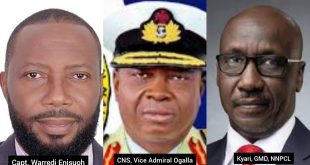 By Kenneth Jukpor
By Kenneth Jukpor
With the nation’s economy settled following the implementation of 2018 budget in the third quarter, MMS Plus x-rays the activities of transport agencies in the third quarter of 2018. Parastatals in the sector were crippled by the financial constraints with indebtedness even on the most negligible amount of money earlier but the funds were finally released. How did the major agencies in the transport sector fare in the third quarter this year?
For the grading system: A =90-100%, B+ = 80-89%, B =70-79%, C+ =60-69%, C =50-59%, D =40-49% and E = 30-39%, F = 0-30%. Enjoy it:
Nigeria Customs Service (NCS)
Nigeria Customs Service is one of the most prioritized government institutions when it comes to the issue of revenue generation but it also has the crucial role to facilitate trade, among other duties. For this rating, we would score the agency based on its performance of four (4) statutory functions:

• Collection of Revenue (Import /Excise Duties & other Taxes /Levies) and Accounting for Same:
NCS experienced impressive improvement in its revenue generation in 2018. Apapa and Tin-Can Island, the two largest Customs Commands have exceeded their monthly targets throughout this period.
NCS had set a revenue target of N1.3 trillion for 2018 and it appears that the service is working assiduously to meet this target. Some strategic measures were introduced by the Customs management to ease revenue collection and blockage of leakages in tandem with international best practices.
After series of trainings, various commands have deployed the Nigerian Customs Integrated System (NICIS II) and it is expected to roll out. The repair of Apapa road is expected to help NCS build on her revenue profile in the last quarter of the year.
NCS makes available its accrued revenue on regular basis as a sign of transparency and accountability in the system. Score = 20/25
• Anti-Smuggling Activities:
NCS may be commended for its intensified efforts and successes in the prevention and suppression of smuggling. The Federal Operations Unit, (FOU) Zone “A”, Ikeja is at the vanguard of these operations and smugglers have received unprecedented clampdown in recent months. There has been great increase in the number of seizures and arrested smugglers.
New strategies were successfully adopted to combat the menace of smuggling with most Commands adopting the “media-Customs partnership model” with journalists where seizures and other activities are brought to the notice of the masses on regular basis.
However, despite these successes, it has been reportedly observed that Customs officers at the ports and border stations aid sharp practices and in turn alert their colleagues at other commands, most especially FOU to intercept the same consignments.
Score = 13/25
• Trade Facilitation/ Engaging in Research, Planning and Enforcement of Fiscal Policies of Government:
Trade cannot be said to be properly facilitated within the period under review mainly as a result of the absence of scanners which led to the burden of physical examination. The status quo remains the same in terms of operations but the recent deployment of NICIS II is expected to change the trend the last quarter.
Nothing has been reported in terms of Research and Planning. While the Federal Government’s ban on land importation of certain items like rice, were done to encourage local production Nigerian markets are still flooded with the foreign parboiled rice while the locally produced ones barely thrives and the same story can be seen in other commodities. Score= 5/25
• Working In Collaboration With Other Government Agencies In All Approved Ports and Border Stations:
Customs’ inter-agency collaboration with sister agencies such as the Nigeria Police Force (NPF), Standards Organization of Nigeria (SON), Nigeria Drug Law Enforcement Agency (NDLEA), National Agency for Food and Drug Administration and Control (NAFDAC), Economic and Financial Crimes Commission EFCC, the Nigerian Army in ensuring compliance, anti-smuggling and other forms of crime combats which includes illegal commercial activities and illicit trade acts is acknowledged.
Score=10/25
Conclusion:
The performance of the Customs so far in 2018 is impressive, especially in the aspect of revenue collections and the recent rejigging of senior officers especially Area Controllers is expected to spur the revenue drive but the burden of scanners remain a major challenge and Customs management should work on this as a matter of expediency because of its security implications to the country.
Grade = E (48%)
Nigerian Airspace Management Agency (NAMA)
NAMA is the nation’s air navigation service provider with the mandate to manage the Nigerian Airspace to a level consistent with the requirements of the ICAO SARPs and make it rank among the safest in the AFI region indeed, the world over.
NAMA has the following responsibilities; to provide safe and functional air navigation services that will meet international standards; to increase Air Traffic Management (ATM) capacity in order to manage the increasing air traffic volume and simultaneously reduce delays, to enhance service quality; To reduce cost for airspace users.
NAMA assured Nigerian passengers and airport users earlier this year about provision of Category 11 and 111 instrument landing systems which enable airlines land and take-off during low visibility. However, several near death experiences were recorded last month as passengers were trapped for hours in fog unable to land. While Max Air on September 17th had passengers face such horrific experience as its aircraft spent 2hours 15minutes from Lagos to Abuja, Air Peace on September 22nd held passengers for over 3hours from Owerri to Lagos, with the plane unable to land and returning to Port Harcourt to refuel before eventually landing in Lagos. Score = 5/25
NAMA collects high fees from the airlines for its services and also in foreign currencies even for flights within the country, while it has failed to provide the highest quality of services for the airlines. This remains a dent to the image of the regulatory authority. Score = 4/25.
On the issue of increasing Air Traffic Management (ATM) capacity, NAMA boss, Capt. Fola Akinkuotu, said the installation of Doppler VOR and distance measuring equipment were on going in 14 airports to replace the old ones. Multi-lateration system has been deployed to the Niger Delta region to take care of helicopters flying in the area. While the agency also installed a backup radio in Kano and Lagos remarking that vigorous trainings for air traffic controllers and engineers were being carried out in order to be at breast with current developments. Score = 12/25
On provision of modern efficient equipment that meet international standards, the agency has recorded minimal development in the first half of 2018. Score= 8/25
Conclusion
The agency achieved some milestone in the development of manpower with the training of core aviation professionals within the agency, it gets an abysmal 29% in its performance for the third quarter of the year, however, one can be optimistic that the agency would improve in its performance by installing the needed navigational aids and equipment that will further enhance air transportation in the country.
Grade F (29%)
Nigerian Ports Authority (NPA)
For the purpose of this study, the functions of NPA, also known as the landlord of Nigerian ports, were grouped in five major areas, with each carrying 20 points:
• Ownership and administration of land and water within port limits/ Planning and development of port operational infrastructure
As part of efforts to bring sanity to the nation’s port environs, NPA dished out instructions to shipping lines stressing that they move acquire and utilize holding bays for storage of their empty containers rather than abandon them on trucks clogging the port access roads. This directive has only moved the traffic gridlock to neighbouring communities as the existing holding bays have been filled while several containers have nowhere to be kept.
Score = 7/20
• Leasing and concession of port infrastructure and setting bench mark for tariff structure
As landlord, the Authority continues to show no concern about the work environs and challenges facing port terminal operators; continuously reneging on promises made to concessionaires in aspects of dredging while it collects duties. The plight of genuine investors like the terminal operators in Calabar port have been neglected by the Authority. Score = 5/20
• Day to day monitoring of operations and enforcement of relevant sections of respective agreements.
Under the leadership of Ms. Hadiza Bala-Usman as the Managing Director, the Authority displayed resilience in monitoring and enforcing relevant national policies like the monetary payment into the Treasury Single Account (TSA).
NPA is currently carrying out the amendment of the concession agreement with the operators and other key agencies of government to eliminate the multiple challenges in the sytem. Score = 15/20
• Responsible for Nautical/Harbour operations and Hydrographic survey/ Marine incidents and pollution
In 2018, the Authority has put to judicious use the tugboats acquired last year for the benefit of the sector but the problem of pollution continues to increase by the day; both at the port access roads, like Tin Can and Apapa and debris at the shores of the ports. Little was done in curbing pollution and issuing statistics on marine incidents so far this year. Score = 5/20
• Maintenance of safety and security at the common user areas/ Enacting port regulations and bye-laws as well as monitor and enforce them
NPA Security personnel have become famous with their corrupt collaboration with the Nigeria Police and Nigerian Navy for extorting truckers and other port users at the port gates; they also ridiculed the improvised port call system for trucks heading to the port as the highest bidder gets access.
The Authority’s role in scrutinizing and ensuring only certified trucks and freight forwarders are allowed entry into the ports has also been marred by corruption as substandard trucks now possess NPA stickers after bribing while anyone could walk into the ports with or without a bribe. Score = 5/20
Conclusion:
The Authority is expected to make significant progress especially with the resilience and drive of the Managing Director, Ms. Hadiza Bala-Usman. One of the highpoints of the third quarter was the inaugural African Regional Conference of the International Association of Ports and Harbours (IAPH) organized in Abuja recently.
Grade = E (38%)
Expect more grading and analysis of other transport sector agencies like Nigerian Shippers’ Council (NSC), Federal Airports Authority of Nigeria (FAAN), National Inland Waterways Authority (NIWA), Accidents Investigation Bureau (AIB), among others, next week.
 MMS PLUS NG – Maritime, Aviation, Business, Oil and Gas News Online Newspaper with coverage in Maritime, Oil and Gas, Aviation, Power and Energy as well as Financial News
MMS PLUS NG – Maritime, Aviation, Business, Oil and Gas News Online Newspaper with coverage in Maritime, Oil and Gas, Aviation, Power and Energy as well as Financial News









